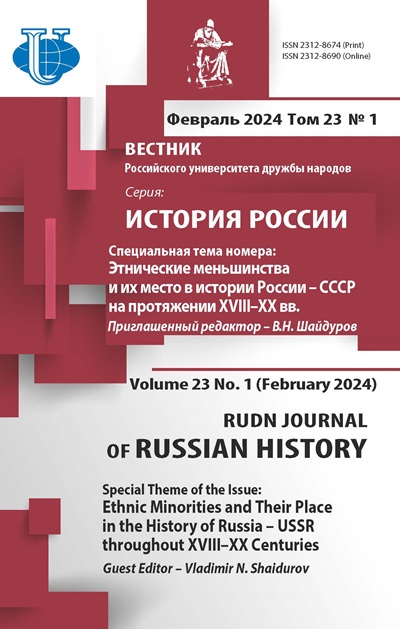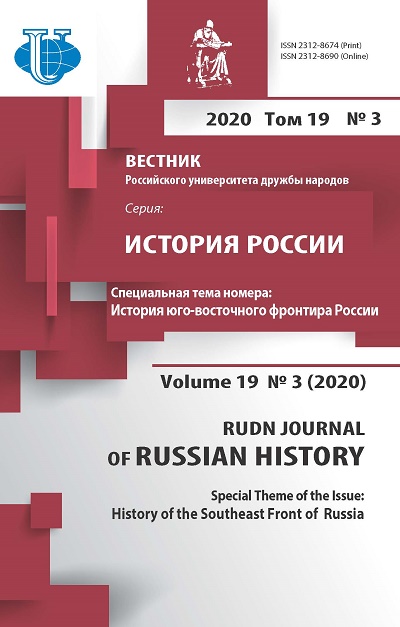The Cultural Populism of Iosif I. Kablits (Yuzov) and its Foundations
- Authors: Mokshin G.N.1
-
Affiliations:
- Voronezh State University
- Issue: Vol 19, No 3 (2020): HISTORY OF THE SOUTHEAST FRONT OF RUSSIA
- Pages: 641-653
- Section: ARTICLES
- URL: https://journals.rudn.ru/russian-history/article/view/24453
- DOI: https://doi.org/10.22363/2312-8674-2020-19-3-641-653
Cite item
Full text / tables, figures
Abstract
This article reconstructs the cultural doctrine of the famous publicist of populism (narodnichestvo), I.I. Kablits (Yuzov). To just equate Kablits’ views with the slogan of “yuzovshchina” would be a narrow interpretation of his kul'turnichestvo; the slogan is characteristic for extreme right-wing populism during the upsurge of the revolutionary populist movement (narodovol'cheskoe dvizhenie). In 1880, Kablits was the first of the legal populists to pose the question, “What is populism?” According to the publicist, “true” narodnichestvo should be based on the principle that the forms of public life of the people must be in conformity with the development level of their consciousness. The author explains Kablits’ evolution from Bakunism to a peasant-centered narodnichestvo by his interpretation of the reasons for the split between the intelligentsia and the people. Kablits considered them antagonists, and defined the ultimate goal of the narodniki as the liberation of the people from the power of the “intellectualbureaucratic minority,” the latter supposedly trying to subjugate the life of the masses to its will. The article analyzes the main provisions of Kablits’ sociocultural concept of social transformations: apolitism, populism, and the initiative of the masses. The article identifies the differences between his program of developing the “cultural identity” of the people, on the one hand, and other populists' understanding of the tasks of “cultural work,” on the other. Particular attention is paid to Kablits-Yuzov's attitude towards the problem of educating the masses. Kablits was one of the few Russian populists who opposed the idea that the foundations of the worldview of the people must be changed, arguing that this would eliminate the traditional moral values of the village, including the sense of collectivism. The author assesses how Kablits, the leading publicist of the newspaper Nedelya, contributed to the establishment of a cultural direction in narodnichestvo at the turn of the 1870s and 1880s. According to the author, Kablits played a leading role in shaping the ideology of the right flank of the cultural direction in narodnichestvo. However, the “pure” populism of Kablits turned out to be too pseudo-scientific, dogmatic and irrational to attract the democratic intelligentsia for a long time; the latter had already become disillusioned with the idea of the people as the creator of new forms of social life.
About the authors
Gennadiy N. Mokshin
Voronezh State University
Author for correspondence.
Email: mok410@mail.ru
Doktor Istoricheskikh Nauk [Dr. habil. hist.], Professor of the Department of Russian History
394068, Russia, Voronezh, Moskovsky pr., 88References
- Aptekman, O.V. Obshchestvo «Zemlya i volya» 70-kh gg. Po lichnym vospominaniyam. Petrograd: Kolos Publ., 1924 (in Russian).
- Baluyev, B.P. Liberal'noye narodnichestvo na rubezhe XIX–XX vekov. Moscow: Nauka Publ., 1995 (in Russian).
- Blyum, R.N. “Nekotoryye metodologicheskiye voprosy izucheniya istorii revolyutsionnoy mysli.” In Uchenyye zapiski Tartuskogo gosudarstvennogo universiteta. Trudy po filosofii, 68–92. Tartu: [S.n.], 1982 (in Russian).
- Byalyy, G.A. “Osnovnyye napravleniya v publitsistike, zhurnalistike, kritike.” In Ocherki po istorii russkoy zhurnalistiki i kritiki, 239–249. Leningrad: LGU Publ., 1965 (in Russian).
- Chervinskiy, P.P. “Otchego bezzhiznenna nasha literatura?” Nedelya, no. 44 (1875): 1427–1433 (in Russian).
- Figner, V.N. Zapechatlennyy trud. Vospominaniya. Moscow: Mysl' Publ., 1964 (in Russian).
- Golosenko, I.A. Sotsiologicheskaya mysl' v Rossii. Ocherki istorii nemarksistskoy sotsiologii posledney treti XIX – nachala XX veka. Leningrad: Nauka Publ., 1978 (in Russian).
- Kablits, I.I. “Intelligentsiya i narod.” Nedelya, no. 10 (1880): 308–313 (in Russian).
- Kablits, I.I. “Chto takoye narodnichestvo?” Nedelya, no. 31 (1880): 981–986 (in Russian). Kablits, I.I. “Liberal i narodnichestvo.” Nedelya, no. 33 (1880): 1055–1057 (in Russian).
- Kablits, I.I. Intelligentsiya i narod v obshchestvennoy zhizni Rossii. St. Petersburg: Tip. N.A. Lebedeva Publ., 1886 (in Russian).
- Kablits, I. Osnovy narodnichestva. St. Petersburg: Tip. N.A. Lebedeva Publ., 1888–1893 (in Russian).
- Kastornov, S.N. Narodniki-reformisty o sotsial'nykh i obshchestvenno-politicheskikh problemakh Rossii vtoroy poloviny XIX – nachala XX vv. Sravnitel'nyy analiz. Orel: OGU Publ., 2002 (in Russian).
- Kovalik, S.F. Revolyutsionnoye dvizheniye semidesyatykh godov i protsess 1930-kh. Moscow: Izd-vo Vsesoyuznogo obshchestva politkatorzhan i ssyl'no-poselentsev Publ., 1928 (in Russian).
- Kornilov, A.A. Obshchestvennoye dvizheniye pri Aleksandre II. Istoricheskiye ocherki. Moscow: Tovarishchestvo tipografii A.I. Mamontova Publ., 1909 (in Russian).
- Kharlamov, V.I. Iz istorii liberal'nogo narodnichestva v Rossii v kontse 70-kh – nachale 90-kh godov XIX v. Obshchestvenno-politicheskiye vozzreniya Kablitsa /Yuzova/. Moscow: MGU Publ., 1980 (in Russian).
- Kharlamov, V.I. “Publitsisty «Nedeli» i formirovaniye liberal'no-narodnicheskoy ideologii v 70-kh – 80-kh godakh XIX v.” In Revolyutsionery i liberaly Rossii: sbornik statey, 163–185. Moscow: Nauka Publ., 1990 (in Russian).
- Khoros, V.G. Russkaya istoriya v sravnitel'nom osveshchenii. Moscow: TSGO Publ., 1996 (in Russian).
- Mikhaylovskiy, N.K. Polnoye sobraniye sochineniy. St. Petersburg: Tip. M.M. Stasyulevicha Publ., 1909 (in Russian).
- Mokshin, G.N. “V.I. Kharlamov and formation of modern historiography of right-wing populism.” RUDN Journal of Russian History, no. 1 (2015): 43–57 (in Russian).
- Mokshin, G.N. “Who are the Populists-Culturnik?” Proceedings of Voronezh State University. Series: History. Political science. Sociology, no. 3 (2016): 82–86 (in Russian).
- Mokshin, G.N. “Main stages of history of “Cultural” Populism.” RUDN Journal of Russian History, no. 2 (2016): 20–29 (in Russian).
- Mokshin, G.N. “Problema rekonstruktsii teorii «malykh del» v otechestvennom narodnikovedenii.” In Narodniki v istorii Rossii: mezhvuzovskiy sbornik nauchnykh trudov, 20–36. Voronezh: VGU Publ., 2016 (in Russian).
- Novak, S.Ya. “Ya.V. Abramov – pioner ‘teorii malykh del’.” Otechestvennaya istoriya, no. 4 (1997): 80–85 (in Russian).
- Obolenskiy, L.Ye. “Literaturnyye vospominaniya i kharakteristiki.” Istoricheskiy vestnik, no. 3 (1902): 882–907 (in Russian).
- Shcherbakova, Ye.I. “Vospominaniya ob uchitele. Anikin A.V.” In «Budushchego net i ne mozhet byt' bez nauk…». (Pamyati professora Moskovskogo universiteta Mikhaila Gerasimovicha Sedova), 450–466. Moscow: MGU Publ., 2005 (in Russian).
- Tikhomirov, L. “Chto takoye narodnichestvo?” Russkoye obozreniye, no. 12 (1892): 915–926 (in Russian).
- Vorontsov, V.P. Nashi napravleniya. St. Petersburg: Tip. M.M. Stasyulevicha Publ., 1893 (in Russian).
- Vorontsov, V.P. Ot semidesyatykh godov k devyatisotym: sbornik statey. St. Petersburg: «Obshchest- vennaya Pol'za» Publ., 1907 (in Russian).
- Yuzov, I. “Budushchnost' sosloviy.” Russkoye bogatstvo, no. 1 (1885): 175–183 (in Russian).
- Yuzov, I. “Derevnya i gorod.” Russkoye bogatstvo, no. 1 (1883): 197–213 (in Russian).
- Yuzov, I. “Natsionalizm, yego priverzhentsy i vragi.” Russkoye bogatstvo, no. 7 (1882): 49–67 (in Russian).
- Yuzov, I. “Sovremennaya russkaya zhizn' i yeye zadachi.” Mysl', no. 1 (1881): 107–118 (in Russian).
- Yuzov, I. Sotsiologicheskiye ocherki. Osnovy narodnichestva. St. Petersburg: Tip. A.M. Kotomina i Ko Publ., 1882 (in Russian).
- Zhvaniya, D.D. Narodniki-reformisty o krest'yanskoy obshchine v 70–90-ye gg. XIX v. (V.P. Vorontsov, I.I. Kablits, P.A. Sokolovskiy). St. Petersburg: Severo-Zapadnaya akademiya gossluzhby Publ., 1997 (in Russian).
- Zverev, V.V. Russkoye narodnichestvo. Moscow: RAGS Publ., 2009 (in Russian).
















